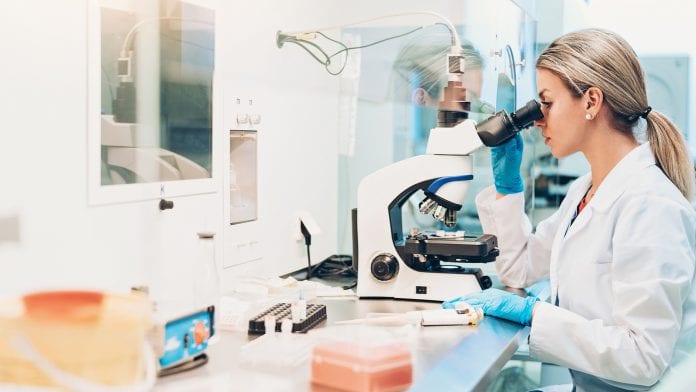
A groundbreaking, randomised controlled trial has shown that umbilical cord-derived mesenchymal stem cell infusions safely reduce risk of death and aid quicker recovery in the most severe COVID-19 cases.
The results describe findings from 24 COVID-19 patients hospitalised at the University of Miami Tower or Jackson Memorial Hospital who developed severe acute respiratory distress syndrome. A team of researchers at the University of Miami Miller School of Medicine led the trial which found that among patients younger than 85 years old, 100% of those treated with mesenchymal stem cells survived at one month.
The results have been published in STEM CELLS Translational Medicine.
A double blind study
In the double blind study, each participant received two infusions given days apart of either mesenchymal stem cells or a placebo. Dr Camillo Ricordi, director of the Diabetes Research Institute (DRI) and Cell Transplant Center at the University of Miami Miller School of Medicine, said that doctors and patients did not know what was infused and that two infusions of 100 million stem cells were delivered within three days, for a total of 200 million cells in each subject in the treatment group.
The findings showed that patient survival at one month was 91% in the stem cell treated group versus 42% in the control group and in patients younger than 85 years old, 100% of those treated with mesenchymal stem cells survived at one month. The team said that the treatment was found to be safe with no serious adverse events and that the time to recovery was faster among those in the treatment arm.
Dr Ricordi said: “The umbilical cord contains progenitor stem cells, or mesenchymal stem cells, that can be expanded and provide therapeutic doses for over 10,000 patients from a single umbilical cord. It is a unique resource of cells that are under investigation for their possible use in cell therapy applications, anytime you have to modulate immune response or inflammatory response.
“We’ve been studying them with our collaborators in China for more than 10 years in Type 1 Diabetes, and there are currently over 260 clinical studies listed in clinicaltrials.gov for treatment of other autoimmune diseases.”
Restoring normal immune response
Mesenchymal cells can help to correct faulty immune and inflammatory responses, have antimicrobial activity, and have been shown to promote tissue regeneration. According to the researchers, mesenchymal stem cells migrate naturally to the lungs when given intravenously – exactly where therapy is needed in COVID-19 patients.
Giacomo Lanzoni, lead author of the paper and assistant research professor at the Diabetes Research Institute, said: “Our results confirm the powerful anti-inflammatory, immunomodulatory effect of UC-MSC. These cells have clearly inhibited the ‘cytokine storm’, a hallmark of severe COVID-19. The results are critically important not only for COVID-19 but also for other diseases characterised by aberrant and hyperinflammatory immune responses, such as autoimmune Type 1 Diabetes.”
Ricordi added: “It seemed to me that these stem cells could be an ideal treatment option for severe COVID-19. It requires only an intravenous (IV) infusion, like a blood transfusion. It’s like smart bomb technology in the lung to restore normal immune response and reverse life-threatening complications.”
The team say the next step is to study use of the stem cells in COVID-19 patients who have not yet become severely ill but are at risk of having to be intubated, to determine if the infusions prevent disease progression.
Implications for autoimmunity
Dr Ricordi highlights that the findings could have major implications for other diseases, in particular, hyper-immune and hyper-inflammatory responses in autoimmune diseases might share a common thread with why some COVID-19 patients transition to severe forms of the disease and others do not.
He said: “Autoimmunity is a big challenge for healthcare, as is COVID-19. Autoimmunity affects 20% of the American population and includes over 100 disease conditions, of which Type 1 Diabetes can be considered just the tip of the iceberg. What we are learning is that there may be a common thread and risk factors that can predispose to both an autoimmune disease or to a severe reaction following viral infections, such as SARS-CoV-2.
The DRI Cell Transplant Center is planning to create a large repository of mesenchymal stem cells that are ready to use and can be distributed to hospitals and centres in North America, he said.
“These could be used not only for COVID-19 but also for clinical trials to treat autoimmune diseases, like Type 1 Diabetes,” he added.
“If we could infuse these cells at the onset of Type 1 Diabetes, we might be able to block progression of autoimmunity in newly diagnosed subjects, and progression of complications in patients affected by the disease long-term. We are planning such a trial specifically for diabetes nephropathy, a kidney disease that is one of the major causes of dialysis and kidney transplantation. We are also planning to do a study on umbilical cord mesenchymal stem cell transplantation in combination with pancreatic islets to see if you can modulate the immune response to an islet transplant locally.”






















